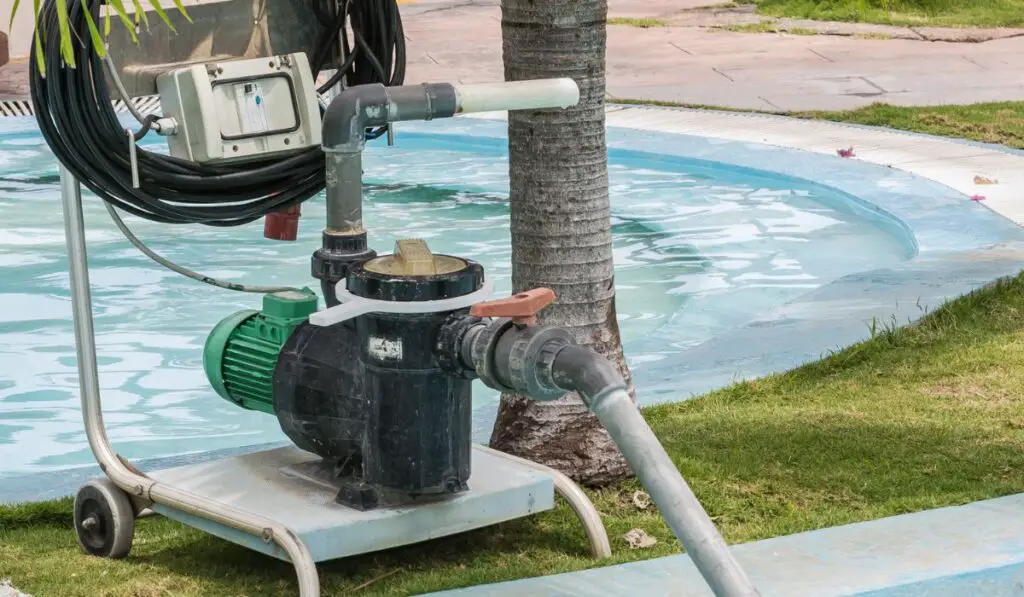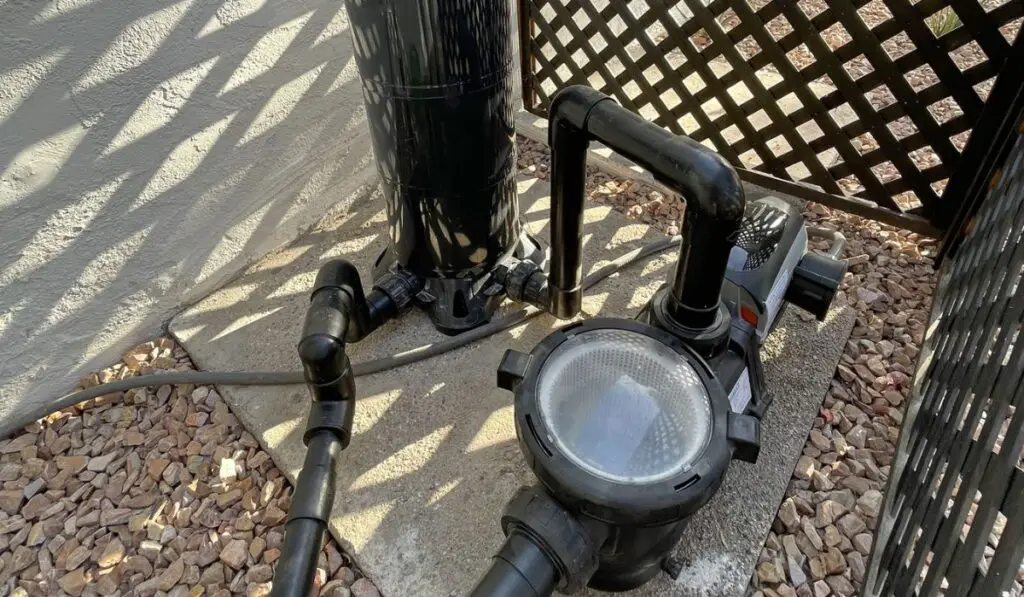Your pool pump is the heart of your swimming pool. It circulates the pool water, ensures all pool chemicals are properly dispersed, and filters out all contaminants through the pool’s cartridge or sand filters. But what should you do if the pump breaks down, and at what point do you replace it completely?
Some pool pump problems are easily fixed, like a clogged impeller or loss of prime. If your lines aren’t clogged and the system is liquid-full, any other pump failure is probably being caused by something you need to call a repair-person to take a look at.
Before you make your decision, make sure you check your pool pump’s overall health first. Even if your pump looks fine, keep in mind that it’s regularly subjected to rain, heat, and pool chemicals. Let’s look at how you can identify a bad pool pump, whether you should fix or repair it, and what you should do with an old model.
How to Tell if Your Pool Pump is Going Bad

If your swimming pool is getting dirty every other day, then it’s highly likely that your pool pump is going bad.
Rumbling sounds or an excessively-vibrating motor are also signs of a faulty pump. These vibrations cause the pump to continuously bump and hit the pool surface, loosening or even completely dislodging it.
Screeching or grinding sounds further indicate that your pool pump has old bearings. If you don’t add new bearings, the motor will overheat and irreparably damage the pump’s windings.
Your pump may also be going bad if it starts blowing bubbles in your pool. If you notice a constant stream of bubbles or feel a bit of sucking action when you’re in the water, then your pump may have a potential air leak — a problem you’ll need to fix as soon as possible.
Lastly, it’s possible that your pump’s just getting old. High-quality, well-maintained pool pumps have an average life of eight to 12 years. So, if your pump is more than 10 years old and is just causing more and more problems, then it’s best to purchase a new one.
Can I Repair My Pool Pump?
While a pool pump can be repaired, the answer to this question ultimately depends on the actual pump problem. Is it the bearings, the capacitor, or an electrical short? Those handy enough to know the basics of a pool pump can easily diagnose and fix simple issues DIY style.
However, if you don’t know your way around a pool pump, then you’ll have to hire a pool technician or take the pump to a motor shop. Here are a few problems that don’t necessitate a pump replacement and can easily be repaired at little to no cost:
Defective or stuck bearings
Bearings are highly susceptible to shock, vibration, and corrosion. If you hear the pump motor making unusual sounds, then you’ll have to replace both front and back bearings.
It’s also advisable to check whether the bearings need lubrication. Dry bearings usually just need a bit of lubrication instead of full replacement.
Stock-up impeller
A lot of debris in your pool can clog up the impeller. Remember to check whether the nuts, bolts, and washer of the impeller are worn out or loose, as they might need replacing as well.
Should You Replace or Repair Your Pool Pump?

It’s important to understand that there’s no simple or definite answer to this question. Before you make your decision, there are a few factors you should consider, including but not limited to:
Age of the pool pump
This is the most important factor that can help determine whether you should repair or replace your pool pump. Although your mileage might vary, a pump that’s more than five or six years old will already have a lot of loose or worn-out internal components.
So, if your pump starts becoming problematic before it hits the five- or six-year mark or while it’s still under warranty, then it’s best to repair it. However, if your pump has passed that mark, then it’s better to completely replace it, as all other components will start failing soon as well.
Availability of parts
Even if you’ve purchased a relatively new pump, you might have gotten something that’s called “new old stock.” These pumps are technically still brand new when you get them, but they’re not the latest models.
This can be a problem because if the manufacturer discontinues that specific model, as it will be difficult to find readily-available parts, which in turn increases the overall price of repairs. In this case, it’s just better to avoid all the hassle and simply get a new pump.
Pump housing damage
If your pump housing is cracked or damaged, then it’s best to replace your pump. This is because modern pump housings are constructed with a composite material that’s essentially impervious to rain, pool chemicals, and other harsh elements.
It’s also important to note that the housing protects all the internal components of the pump system. So, if you have a cracked housing, then water might already have entered the pump, corroding the components and leading to eventual pump failure.
If your pool pump is under warranty, contact your manufacturer and check whether they can provide you with a replacement. However, if the pump has passed the warranty period, then it’s time to purchase a new one.
Your DIY skills
While this factor is not directly related to the actual pool pump, it’s important to consider your confidence and skills before you decide to repair your broken pump.
If you’re mechanical and handy, then you can easily complete minor pump repairs, such as changing the pump bearings or mechanical seals. Replacing the pump’s impellers and capacitors are fairly easy tasks as well and can be done by anyone with good DIY skills.
Also, if you know your way around a pool pump, then the total cost of fixing it will only include the amount you’ll have to pay for the replacement parts. However, if you’re hiring someone else, then the repair expenses might be more than the cost of the parts themselves.
Repair vs Replacement: Quick Reference
With these factors in mind, here’s a basic rundown of the benefits of repair vs replacement.
You should repair your pool pump if:
- You only need to replace the bearings.
- The impeller is clogged or stuck.
- The repair itself isn’t too expensive.
You should replace your pool pump if:
- The motor has passed its expected lifespan.
- It keeps malfunctioning even after repairs.
- The repair costs are almost the same as replacement costs.
- You have an old motor pump and you need an upgrade.
- The performance of your current pool pump is not satisfactory.
What Should I Do With My Old Pool Pump?
With expensive repairs and much-needed pump upgrades and replacements, it’s no wonder that people end up with a large stockpile of old pool pumps. However, instead of just throwing them in the trash, here’s what you can do with your older models:
Recycle it
Pool pumps are constructed with a lot of metal you can salvage and recycle. Your local recycling center would love to get their hands on the steel and iron in your old pool pump, while a salvage yard would be more interested in the stainless steel, copper, bronze, aluminum, and brass of your pump.
Sell it
People are always looking for pool pump parts for a bit of DIY repair. You’ll be able to find excellent buyers for your pool pump motor, hose, and filter.
Make sure you check an online marketplace for the most in-demand components and then list down the parts you’ll be able to sell from your own old pool pump.
Recreational use
Recycling, selling, and salvaging your old pool pumps are excellent ideas, but there are also a few more fun options you can opt for.
You can use your old pool pump to make a waterfall or pond in your backyard. You can even use it for lawn sprinklers, pressure washers, vertical hydroponic gardens, and unique holiday decorations.
